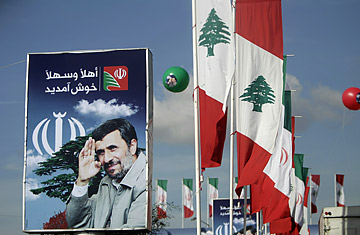
A portrait of Iran's President Mahmoud Ahmadinejad near Beirut International Airport on Oct. 12, 2010, ahead of the hard-line leader's first visit to Lebanon
When word got out last month that Iran's President Mahmoud Ahmadinejad intended to visit Lebanon this week and possibly throw stones at the country's border fence with Israel, the foreign press corps of Beirut started to get a little excited. After a long sleepy news cycle since the end of the Lebanese political crisis of 2008, what journalist wouldn't want to be watching when the man Israel's leaders have likened to Adolf Hitler strikes a militant posture within sniper range? And that's exactly why Ahmadinejad is headed to town: while the U.S. does its utmost to make Ahmadinejad a global pariah, his very notoriety makes him a darling of the world's press.
So it has come as a bit of a disappointment, to the media at least, that the rock-throwing excursion is not on the official agenda of Ahmadinejad's two-day visit, which starts on Wednesday. It's not clear why Iranians had second thoughts. Perhaps it was too much of a risk that a lone Israeli soldier might take matters into his own hands. Nevertheless, Ahmadinejad's Lebanon trip as a whole — with or without rock throwing — will be exciting, perhaps too exciting. Intended by the Iranian government to showcase Iran's influence in the region despite U.S. attempts to contain it, Ahmadinejad's visit may also be a sign that the period of wary détente in the regional cold war between Iran and the U.S. is drawing to an end.
Tiny Lebanon, with its strategic location and sectarian political system easily manipulated by foreigners, has often been a battlefield for regional power struggles. And that makes it a perfect stage for Ahmadinejad to theatrically tweak the noses of Iran's enemies. The U.S. and Israel lobbied the Lebanese government — which is split between allies of Iran and allies of the West — to block the Ahmadinejad visit. But the pressure backfired, prompting the respected Lebanese President Michel Suleiman, one of the country's few neutral figures, to assert Lebanon's independence and its right to welcome foreign leaders as it sees fit.
Ahmadinejad's visit will also highlight what has been one of Iran's great foreign policy successes: the Lebanese militant group Hizballah, the Tehran-backed Shi'ite Muslim movement that has become the most powerful political force in Lebanon and a formidable proxy of the Iranian military deployed on Israel's doorstep. Hizballah has been preparing a hero's welcome for Ahmadinejad, lining Beirut's airport road with Iranian flags, portraits of Ayatullah Khamenei and the late Ayatullah Khomeini and Photoshopped posters of Ahmadinejad underneath a Lebanese cedar tree. Ahmadinejad will no doubt return the compliment, praising the steadfast anti-Israeli resistance with visits to those Hizballah-populated areas in south Beirut and southern Lebanon that were bombed to smithereens by Israel during the 2006 war and rebuilt in part with Iranian funds.
But Lebanon is by no means united in rolling out the red carpet for the Iranian President. The pro-Western political coalition that represents Lebanon's Sunni Muslims and roughly half its Christians — and which holds a slim majority in parliament — has called Ahmadinejad's visit a needless provocation. Ever since Hizballah sparked a war with Israel in 2006 by attacking a squad of Israeli soldiers, these groups have been worried that the movement's continued fielding of a powerful military force independent of the Lebanese state dooms the country to continuous cycles of war and upheaval. Despite having won the parliamentary elections, these Western-supported groups backed down in the face of Hizballah-orchestrated demonstrations and street fights, and in 2008 accepted a compromise deal that gave the Shi'ite movement veto power over all major government decisions.
Since then, however, the limits of Hizballah's power in Lebanon have become more apparent. The movement is keenly aware that it will lose support even from its own Shi'ite base if it's seen to be trying to start another war with Israel. And Hizballah has been on the defensive against rumors that a U.N. tribunal in the Hague may issue indictments against some of its members for the 2005 murder of former Prime Minister Rafiq Hariri on orders from Syria. Perhaps in response to mounting sectarian tension, Hizballah leader Hassan Nasrallah himself appeared to be subtly encouraging Ahmadinejad to drop the stone-throwing adventure. "If President Ahmadinejad asks my opinion, I would tell him, 'A stone? You are capable of throwing more than a stone,'" Nasrallah said in a speech last weekend.
At a regional level, Iran is also losing steam. The Obama Administration has ended its predecessor's disastrous attempts to change the map of the Middle East through military force — policies that strengthened Iran's hand from Afghanistan to Gaza. And while Obama's policies of engagement and pressure have failed to resolve tensions over Iran's nuclear program, they have bought time for the Islamic Republic's own problems to become more apparent. The protest movement that emerged after Iran's contested presidential election in June 2009 showed that a large part of Iranian society cares more about reforming their own system than in exporting Islamic resistance. And though the Iranian government appears to have successfully muzzled the so-called Green movement, Ahmadinejad is facing growing criticism from the right over his mismanagement of the economy, exacerbated by international sanctions.
Weakened leadership in Washington and in Tehran, and scores of potential flashpoints stretching from Kabul to Jerusalem, have created a dangerous, unstable moment in the Middle East. Ahmadinejad may have backed down from throwing stones, perhaps in deference to Hizballah's delicate position, but his trip is a signal that Iran won't be backing down from its confrontation with the U.S. — a confrontation that may yet play out once again on Lebanese soil.
— With reporting by Rami Aysha / Beirut
